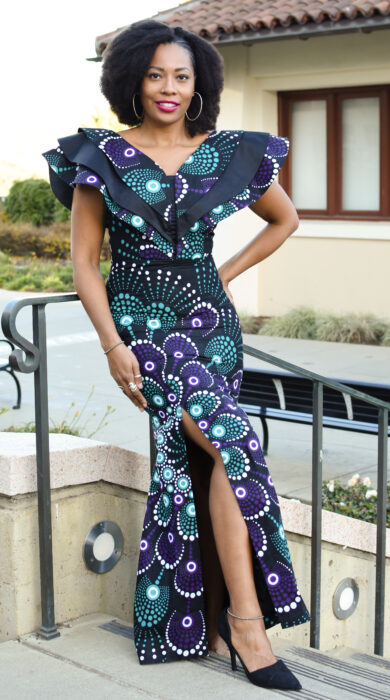
Kirstie Kwarteng was born in the US to two Ghanaian parents, and spent her formative years growing up in the diaspora community within the Washington, D.C. area.
She has worked extensively in academia, focusing on diaspora and transnationalism.
Kirstie is acclaimed for winning the TEDxEuston ideas search, speaking at the final TEDxEuston event, and being awarded a Dudley Stamp Memorial Award from the Royal Geographical Society.
In this exclusive interview with Diaspora Digital News, we are excited to speak with Kirstie about her experiences as a second generation diasporan, work in academia, the flagship Nana Project, and what drives her to continue pushing for effective diaspora engagement in communities.
Family influence in current work and academia
“Growing up, my family moved around the US quite a bit but we were able to connect with Ghanaian diaspora populations in the cities we lived in. These years are directly related to the work I’m doing now”, says Kirstie.
She is currently completing a PhD in Development Studies at SOAS, University of London; and her dissertation is focused on the transnational experiences of second-generation Ghanaians and how they maintain their connections to Ghana.
“My academic work focuses on African diaspora populations and second-generation transnationalism. As a second-generation Ghanaian, I feel it is especially important to highlight the experiences of second-generation populations because there is still a lot of misconceptions about the children of immigrants, and how they relate to and engage with their countries of origin.”
Kirstie frequently shares her work at conferences where she can connect with like-minded scholars.”
“I’ve also recently started working as a Research Manager with Shabaka Social Enterprise, a diaspora-led research organization focused on migration, development, and humanitarianism. I’m grateful to be working with an organization that is aligned with my research interests and values”, she adds.
The Nana Project
Kirstie is the Founder of The Nana Project – an innovative initiative preserving Ghana’s history for future generations on a digital platform. She narrates her motivation for setting up the Project and the impact it is making:
“The Nana Project was birthed from a place of grief. In 2007, I lost my maternal grandmother. She was 96 years old. She came from Ghana to the US around the time of my birth and helped raise my sister and I until we were just about teenagers. The year my grandmother died was also the year Ghana celebrated its’ 50th anniversary of independence. I realized my 96-year-old grandmother was 46 at Ghana’s independence and had taken nearly a half century of Ghana’s colonial history with her when she passed. I felt a great deal of remorse about this and wanted to do something that would allow us to learn Ghana’s history from our elders while they were still around to share it. The word ‘Nana’ means grandparent or elder in Twi, which is why I gave our platform the name The Nana Project. Since starting the project we’ve had the privilege of sitting with Ghanaian elders and having them share their life stories and memories of Ghanaian history with us. We’ve also encouraged people in our online community to speak with the elders in their families so they can learn their family histories as well.
At a commemoration of Ghana’s Republic Day on July 1, The Nana Project worked in partnership with Project 1957, an organization created by second generation Ghanaians in London, to organize an event on Ghana’s history, art, or culture.
“I feel it is especially important to highlight the experiences of second-generation populations because there is still a lot of misconceptions about the children of immigrants, and how they relate to and engage with their countries of origin.”
– Kirstie Kwarteng
Kirstie does not only focus on The Nana Project. She has also worked with the Future of Ghana on their research project highlighting the identity formation and engagement practices of British-Ghanaians. While living in the Washington, D.C. area she was a member of the Diaspora African Women’s Network (DAWN).
In spite of all the successes chalked, Kirstie has faced a number of challenges working within the diaspora community; especially with regards to a lack of understanding on the importance of her work mainly due to misconceptions about second and subsequent generations in diaspora populations.
“People think we are not connected to what’s going on in our home countries, or that we don’t care; and that couldn’t be further from the truth. How we engage with our countries of origin may be different from how the first generation engages but it isn’t any less meaningful or impactful, both in our countries of origin and in our diaspora communities”, she adds.
Kirstie subscribes to the idea of work-life balance and so she really values rest and enjoys doing things that are relaxing and revitalizing in her free time.
“I enjoy exercising, reading, and spending time with my friends and family. I have a good number of friends and family that live in different countries so I enjoy ‘Facetiming’ or ‘WhatsApping’ my loved ones that are far from me”, concludes the tech-savvy Kirstie.
To know more about The Nana Project, kindly visit the website.
Interview by: Theresa R. Fianko
Image Attribution: Kirstie Kwarteng
Find out how our CONSULTANCY can help you with your Content Writing, Digital Marketing and PR requirements HERE.
Check out the latest diaspora, migration and diplomatic related Jobs HERE.
Submit your Press Release / Related Contributions HERE.
RELATED NEWS AND STORIES




